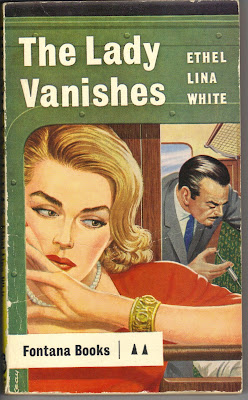
(Actual title is The Wheel Spins, but Amazon and Goodreads have apparently decided to rename it. To be fair, The Lady Vanishes is a much better title.)
Iris Carr is a spoiled, wealthy young woman on holiday at some vaguely Alpine resort filled with English tourists. After catching the last train out to Trieste, Iris meets the bubbly Miss Froy, a middle-aged governess returning to England after years abroad. Iris decides to take a nap and when she wakes up, Miss Froy has disappeared. Even more strange is that everyone denies she was even on the train! Certain that something terrible has happened to Miss Froy, Iris enlists the help of the men folk, but they think she's crazy. After a while, Iris starts to wonder if they aren't right.
If you've seen the movie by Alfred Hitchcock, The Lady Vanishes, Ethel White's novel is very similar (in Fear in the Sunlight, Nicola Upson painted Hitch as someone who had no respect for the original work when adapting novels to film; she obviously knows shit-all about Hitchcock movies), right down to the time symbolism and British ethnocentrism. Honestly, the only difference between the book and the movie is that White gives us a ton of backstory about all the other English passengers on the train and why they don't mention they've seen Miss Froy, plus scenes of Miss Froy's family waiting for her in England. So we know from the outset that Miss Froy is real and not a figment of Iris's imagination, which kind of takes the fun out of the whole thing. I also really didn't care about the other English passengers. At all.
In other words, the movie is better than the book. Don't feel the need to read The Wheel Spins/Lady Vanishes, even if you love the movie.
That being said, I found the elaboration of themes in the novel interesting. You might be familiar with a story Hitchcock told François Truffaut in their 1962 interview about The Lady Vanishes and how it was based on a "true story" of a mother and daughter who traveled to Paris at the start of the Paris Exposition and checked into separate rooms in a hotel. When the daughter woke up from a nap, her mother was gone, her luggage had disappeared, and the room didn't appear to have been slept in. When the daughter asked the desk clerk, he said she'd checked into the hotel alone, and everyone else from the maid to the coachman who'd taken them to the hotel confirmed the desk clerk's story. People assumed the daughter was crazy. In fact, during the daughter's nap, her mother had died of the plague. The hotelier and city officials, fearing a plague scare would keep people away from the Exposition, decided to bury the body and pretend as if the woman had never existed.
That story is actually in the novel, along with several other urban legends that underscore how women are presumed to be neurotic and delusional until proven otherwise, and also how easily a woman's identity can be erased. I really liked that there are stories-within-stories in The Wheel Spins that served to create an atmosphere of paranoia on the train, although I don't think White cashed in on this as effectively as Hitchcock did.
Another thing I found interesting was the role of men in the story. There are only a few male characters, but the women are completely dependent upon them because only the men can communicate with the outside world (well, except for Miss Froy: she speaks 10 languages, although we never actually see her speaking any foreign language during the course of the book). The Professor and "Hare" (a reference to the white rabbit from Alice in Wonderland?), two Englishmen who help Iris, are both linguists and fluent in whatever language the locals speak; but even men who don't speak the language can communicate with the outside world. For example, the clergyman who stayed at the same hotel as Iris left every day to sit with the locals in the village, leaving his wife behind to remark that she didn't know how he communicated with them when he didn't speak one word of the language. A big deal is also made of the fact that Iris is absolutely terrible with languages, so that everything she says to local people on the train is interpreted through a male voice—and a misogynist male who thinks she's by turns annoying and delusional, at that. The Wheel Spins really underscores female dependency on men, much more so than The Lady Vanishes.
I actually did enjoy the first half of The Wheel Spins, but Iris started to get annoying because she constantly runs to either the Professor or Hare to fix things for her when that is CLEARLY not working. Why doesn't she do something herself? The second half is also filled with literally paragraphs upon paragraphs of exposition telling us about character motivation. TELLING, not showing. The conclusion of the novel was also a disappointment. I love the end of The Lady Vanishes movie because Miss Froy turns out to be a badass, and there are a ton of fun magic references and a shoot-out. That does NOT happen in The Wheel Spins. I won't spoil the ending for you, but it was really lame, drawn-out, and anti-climatic.
Basically, you could spend five hours of your life reading this book, or ninety minutes watching the movie. Not to mention the book isn't in the public domain (and yet the movie is... makes no sense), so you actually have to pay for it. Not worth it. I'd only recommend The Wheel Spins/Lady Vanishes to those with a vested interest in Pre-War women and literature.
Discus this post with me on Twitter, FaceBook, Google+ or in the comments below.
